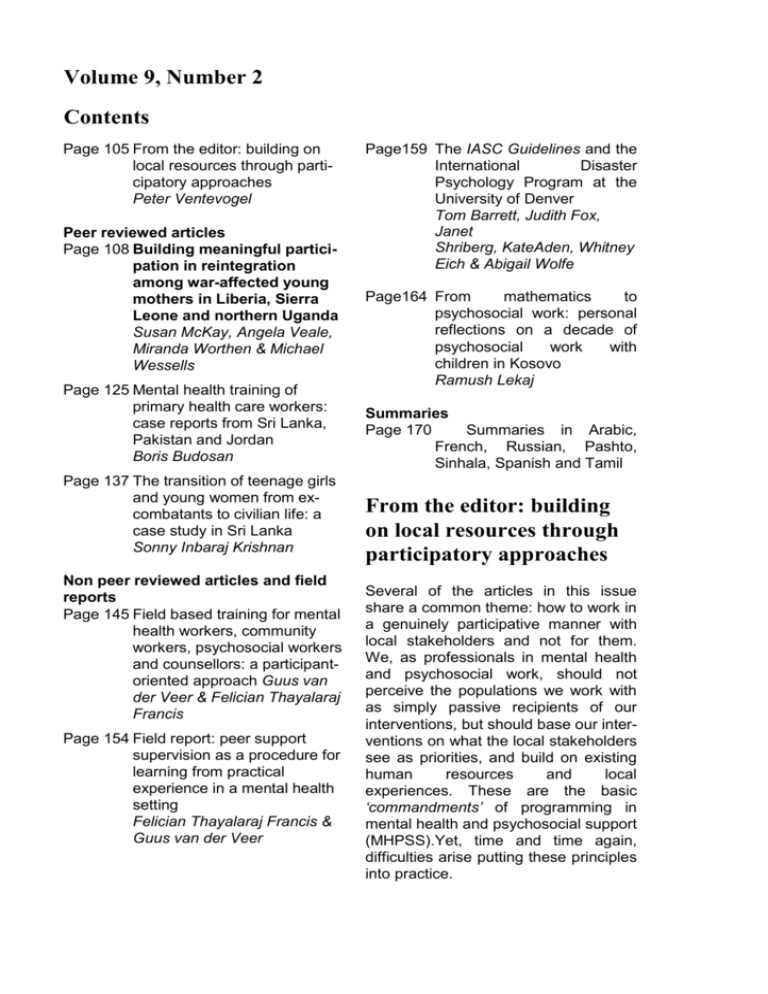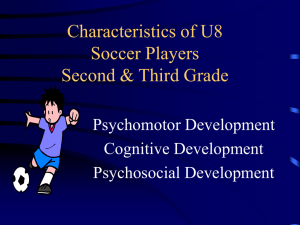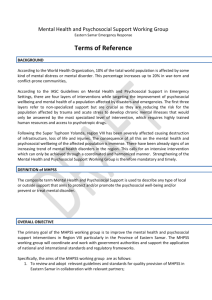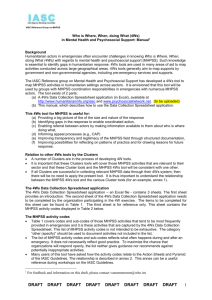The importance of participatory approaches in the reintegration of
advertisement

Volume 9, Number 2 Contents Page 105 From the editor: building on local resources through participatory approaches Peter Ventevogel Peer reviewed articles Page 108 Building meaningful participation in reintegration among war-affected young mothers in Liberia, Sierra Leone and northern Uganda Susan McKay, Angela Veale, Miranda Worthen & Michael Wessells Page 125 Mental health training of primary health care workers: case reports from Sri Lanka, Pakistan and Jordan Boris Budosan Page 137 The transition of teenage girls and young women from excombatants to civilian life: a case study in Sri Lanka Sonny Inbaraj Krishnan Non peer reviewed articles and field reports Page 145 Field based training for mental health workers, community workers, psychosocial workers and counsellors: a participantoriented approach Guus van der Veer & Felician Thayalaraj Francis Page 154 Field report: peer support supervision as a procedure for learning from practical experience in a mental health setting Felician Thayalaraj Francis & Guus van der Veer Page159 The IASC Guidelines and the International Disaster Psychology Program at the University of Denver Tom Barrett, Judith Fox, Janet Shriberg, KateAden, Whitney Eich & Abigail Wolfe Page164 From mathematics to psychosocial work: personal reflections on a decade of psychosocial work with children in Kosovo Ramush Lekaj Summaries Page 170 Summaries in Arabic, French, Russian, Pashto, Sinhala, Spanish and Tamil From the editor: building on local resources through participatory approaches Several of the articles in this issue share a common theme: how to work in a genuinely participative manner with local stakeholders and not for them. We, as professionals in mental health and psychosocial work, should not perceive the populations we work with as simply passive recipients of our interventions, but should base our interventions on what the local stakeholders see as priorities, and build on existing human resources and local experiences. These are the basic ‘commandments’ of programming in mental health and psychosocial support (MHPSS).Yet, time and time again, difficulties arise putting these principles into practice. From the editor: building on local resources through participatory approaches Intervention 2011, Volume 9, Number 2 Page 105-107 The importance of participatory approaches in the reintegration of former combatants In the opening article of this issue, Susan McKay, Angela Veale, Miranda Worthen & Michael Wessells describe an innovative approach working with young mothers who were formerly associated with the armed forces. The project was unique collaborative process, bringing together academic institutions, local and international nongovernmental organisations, and young women and girls, for a project in community-based, participatory action research (PAR), in Liberia, northern Uganda and Sierra Leone. PAR is a research approach, in which collaborative inquiry by researchers and the community involved aims to resolve the social problems and issues in that community. Research has a role to play in social transformation; through the active participation of groups and communities. To state it plainly, PAR is learning by doing: ‘a group of people identify a problem, do something to resolve it, see how successful their efforts were, and if not satisfied, try again’ (O’Brien, 2001). This approach is rooted in a respectable tradition of social psychology and has been used throughout emancipatory social movements, particularly in Latin America. Auseful introduction to PAR was published last year, in this journal (Arnoso Mart|nez & EiroaOrosa, 2010). Sonny Inbaraj Krishnan focuses on the reintegration of young female former Tamil Tiger fighters in Sri Lanka. He concludes that project planners ignore existing female support networks within a matrilineal society that have helped the women survive the conflict. The projects aim was to reconcile ex-combatants with their communities while there was actually not so much to reconcile between them. The projects ignored the real problem: a lack of trust in both the female ex-combatants, and the Tamil communities as a whole, towards the Sri Lankan state and its agencies. An ill informed communitycentred reintegration approach was used, whereas it would have been more appropriate to specifically support existing, women’s social networks within the same community that the women rely on for their survival. Making training appropriate for context and participants Guus van der Veer & Felician Thayalaraj Francis describe the principles of how to make tailored trainings for mental health, community, and psychosocial workers and counsellors. The authors are both experienced MHPSS practitioners and trainers and express their dissatisfaction with trainings that do not often address the practical needs of the trainees. Most of the MHPSS work implemented in (post)conflict and disaster areas is done by MHPSS workers who have little or no education relevant to their job. The authors observe that inappropriate trainings can do more harm than good, and can provide some terrible examples of how training made participants less capable of helping others. The article illustrates how some training invalidates the experiences they have acquired, through ‘learning by doing’. Unfortunately, this is not an exception. In an earlier article, Baron (2006) provided striking examples of how ill informed, top-down trainings in an ‘one size fits all approach’, and without proper supervision and follow up, can have devastating consequences. Building on earlier work by the first author (van der Veer, 2006) the authors advocate participant-oriented training, in which trainees can build on their own strengths and learn how to improve their skills to ‘help through talking’. In a related field report, Felician Thayalaraj Francis & Guus van der Veer describe how they put these principles into operation in a low budget project for skills development and peer supervision for staff of mental health units in hospitals in Sri Lanka. It is not only field practitioners that need to adapt their training to the requirements of the field. Academic training would also benefit if more field oriented. Tom Barrett, Judith Fox, Janet Shriberg, Kate Aden, Whitney Eich & Abigail Wolfe describe, in a short contribution, how the IASC Guidelines and various publications on this subject in this journal, have influenced the curriculum of the International Disaster Psychology Program at the University of Denver in the United States. Boris Budosan reports on mental health trainings for public health care workers in three different settings (Jordan, Pakistan and Sri Lanka), to include mental health care as part of the public health care system. He suggests that sustainable changes in mental health practices can only be achieved as a result of the combined efforts of various stakeholders, including the government. A personal reflection Finally, Ramush Lekaj, shares with us how the violence in his native Kosovo forced him to abandon his career as a professor in mathematics, and become involved in psychosocial work within the educational system. He has repeatedly witnessed, firsthand, how local experience has been ignored by international agencies. The author stresses the pivotal role of teachers as the key agents in improving psychosocial support to children, and emphasises the importance of strengthening local capacity, rather than international agencies implementing projects with expatriate staff. I would like to invite other experienced MHPSS practitioners to share with us how their personal experiences and professional development have interacted, as Mr Lekaj has done in this issue, and as the Afghan psychosocial worker, Laily Samadi, did in 2009. Peter Ventevogel editor in chief References Arnoso Mart|a nez, M. & Eiroaa -Orosa, FJ. (2010). Psychosocial research and action with survivors of political violence in Latin America: methodological considerations and implications for practice. Intervention, 8,3-13. Baron, N. (2006). The ’TOT’: a global approach for the training of trainers for psychosocial and mental health interventions in countries affected by war, violence and natural disasters. Intervention, 4,108-125. O’Brien, R. (2001). Um exame da abordagem metodológica da pesquisa ação [An overview of the methodological approach of action research]. In: Roberto Richardson, (Ed.), Teoria e Pratica da Pesquisa Ação [Theory and practice of action research]. João Pessoa, Brazil: Universidade Federal da Paraíba. (English version) Available: http://www.web.ca/~robrien/papers/arfinal. html (Accessed 16/05/2011). Samadi, L. (2009). Feedback from local staff How my life has changed: experiences of an Afghan woman working with a psychosocial project. Intervention, 7,152155. van der Veer, G. (2006). Training trainers for counsellors and psychosocial workers in areas of armed conflict: some basic principles. Intervention, 4, 97-108.








